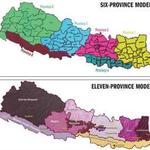Nepal is in the process of forming a federal state, where the map is likely to be drawn based on the ethnic composition of the provinces. But will, in fact, particular ethnic groups have a majority in any province that may be named after them? The analysis indicates a clear conflict between so called economic viability and ethnic based federalism. In particular, it is essential to keep in mind that the largest "ethnic" group of Nepal is a so-called high caste group, the Khas-Chettri. And the strong Madhesi movement represents numerous ethnic and caste groups with conflicting economic and social interests. And, finally, there is no hill ethnic group that will have a majority in any province, unless that province consists of very few districts.
http://setopati.net/opinion/3468/
Magnus Hatlebakk







